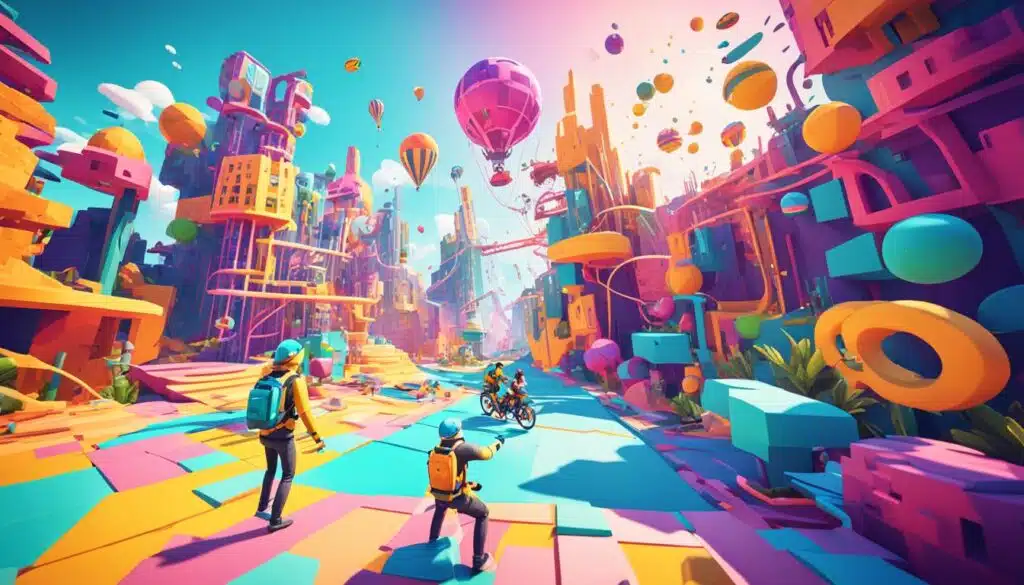Welcome to our article on the top programming languages for game developers. If you have a passion for creating video game concepts and bringing virtual worlds to life, then this article is for you. Programming languages play a critical role in game development, enabling developers to build dynamic and immersive gaming experiences.
Whether you are a seasoned game developer or just starting your journey in the game development industry, choosing the right programming language is essential. Each programming language offers unique capabilities and features that contribute to the ease of development, efficiency of game logic, and compatibility with game engines.
In this article, we will explore the most popular programming languages used by game developers and highlight their strengths and suitability for different types of games. From versatile languages like Java and Python to powerful languages like C++ and C#, we will delve into how each language can help you create captivating video game worlds.
Also Read : Unlocking Creativity: A Developer’s Guide To Game App Innovation
Key Takeaways:
- Choosing the right programming language is crucial for game developers to create captivating virtual worlds.
- Java offers versatility and compatibility, making it ideal for developing popular games, including Android and mobile games.
- Python is a popular scripting language known for its simplicity and power, perfect for developing 2D games.
- Unity, powered by C#, provides a powerful and versatile environment for developing games with complex game logic and intricate designs.
- JavaScript is widely used for web-based game development, offering simplicity, ease of use, and support for creating 3D games.
Importance of Choosing the Right Programming Language
When it comes to game development, choosing the right programming language is of utmost importance for game developers. The programming language used can greatly impact the ease of development, the efficiency of game logic, and the compatibility with game engines. Each programming language offers unique features and capabilities that suit different types of games.
Game developers need to consider several factors when selecting a programming language. Firstly, they should assess the specific requirements of their game and determine which language best aligns with those needs. Some languages excel in handling complex game logic, while others are better suited for simpler 2D games. Additionally, compatibility with popular game engines should be considered to ensure seamless integration and optimal performance.
Furthermore, the language used significantly influences the developer’s workflow and productivity. Familiarity with a programming language can significantly reduce development time and enhance the overall development process. Developers who are well-versed in a specific language can leverage their existing knowledge and skills to create high-quality games efficiently.
Moreover, the choice of programming language is closely tied to the target platform. Different languages are better suited for specific platforms such as PC, console, web, or mobile. Game developers need to consider the platform they intend to release their game on and choose a programming language that provides the necessary support and compatibility.
“Selecting the right programming language for game development is like choosing the right tool for the job. It can make the difference between a successful and efficient development process and a series of challenges and limitations.” – John Reynolds, Game Developer
By carefully evaluating the requirements, capabilities, and compatibility of different programming languages, game developers can make informed decisions and select the best language for their game development needs. To help you understand the pros and cons of various programming languages for game development, let’s explore some of the most popular options used by game developers today.
Also Read: Vintage Play: The Essentials Of Retro Game Collecting For Beginners
Comparison of Programming Languages for Game Development
Java: A Versatile Language Used by Game Developers
When it comes to game development, Java is a programming language that stands out for its versatility and wide-ranging applications.
Java is extensively utilized by game developers in the industry, thanks to its compatibility with multiple game engines and its ability to create immersive virtual worlds. This makes it an ideal choice for developing popular games, including Android games and mobile games.
One of the key advantages of Java is its object-oriented programming (OOP) approach. This approach simplifies game development by allowing developers to organize code into reusable objects, making it easier to manage and update their games.
Furthermore, Java’s object-oriented nature makes it conducive to collaboration among multiple developers working on the same project. The modular design of Java allows developers to work on different aspects of the game simultaneously, improving overall efficiency and productivity.
Another significant benefit of Java for game developers is its robust support for Android game development. With the ever-increasing popularity of mobile games, Java’s compatibility with the Android platform provides developers with the tools necessary to create engaging and visually stunning games on this platform.
In addition, Java offers a vast array of libraries and frameworks specifically designed for game development. These libraries provide pre-built functions and resources that expedite the development process and enable developers to create complex game mechanics with relative ease.

Whether it’s creating captivating characters, implementing intricate game logic, or optimizing performance, Java equips game developers with the necessary tools to bring their ideas to life. Its versatility, compatibility, and support for object-oriented programming make it an indispensable language in the game development industry.
Also Read : Top Emulators For Retro Gaming On PC: Relive The Classics With Precision And Ease
Python: Simplicity and Power for Game Developers
When it comes to game development, Python is a scripting language that is highly favored by game developers. Its combination of simplicity and power makes it an excellent choice for creating immersive gaming experiences. Whether you’re a beginner starting out or an experienced developer, Python offers a user-friendly environment that allows you to bring your 2D game ideas to life.
One of the key advantages of Python is its easy-to-read syntax, which enhances the development process by reducing the time and effort required to write and debug code. This simplicity allows developers to focus on the creative aspects of their game, refining game mechanics and designing captivating gameplay.
Python’s versatility for game development is due to its extensive library and framework support. The Python ecosystem provides a wide range of resources that enable game developers to leverage preexisting code and assets to streamline their development process. These libraries and frameworks offer tools and functionalities specifically tailored for game development, making it easier to handle graphics, audio, and user input.
Furthermore, Python’s versatility extends beyond developing standalone 2D games. It can also be used as a scripting language within larger game engines, allowing developers to take advantage of Python’s simplicity while working on complex, multi-faceted game projects.
Despite its simplicity, Python is a powerful language that can handle the demands of modern game development. The ability to combine Python with other languages and technologies further expands its capabilities, providing developers with the flexibility to create games with advanced features and mechanics.
“Python’s simplicity and power make it an incredibly flexible tool for game developers. Its ease of use and extensive library support provide developers with the resources they need to bring their 2D game ideas to life.”
Python’s popularity among game developers is also attributed to its similarities to other widely-used languages like Python. If you’re already familiar with languages like JavaScript or Ruby, transitioning to Python for game development will be a smooth process. This makes Python an attractive choice for developers looking to expand their skill set or collaborate with teams that use different programming languages.
Advantages of Using Python for Game Development
Python’s simplicity and power, paired with its extensive library and framework support, offer several advantages for game developers:
- Easy-to-read syntax and reduced development time
- Extensive library and framework support for game development
- Compatibility with other programming languages
- Smooth transition from other scripting languages
- Support for creating standalone 2D games or integrating with larger game engines
If you’re a game developer looking for a language that combines simplicity, power, and versatility, Python is an excellent choice. Its wide range of applications, ease of use, and extensive support make it a popular language for developing 2D games and beyond.

Also Read : Top Free Online Gaming Sites Ranked | Play Now!
Unity: Harnessing the Power of C#
Unity is a widely used game engine that has become a go-to choice for many game developers. One of the primary reasons for its popularity is its powerful integration with the C# programming language. C# provides a versatile environment for developing video games with intricate designs and complex game logic.
The integration of C# with Unity offers game developers a robust set of tools and features to create interactive and visually stunning games. By harnessing the power of C#, developers can implement game mechanics, control game behavior, and manage game data efficiently.
The C# language itself is known for its versatility, making it an excellent choice for game development. Its object-oriented nature allows developers to model game entities and implement game features in a structured and organized manner. This results in cleaner code, easier debugging, and greater maintainability.
Unity’s built-in scripting capabilities further enhance the development process. Developers can write C# scripts to define game behavior, create custom editor tools, and interact with Unity’s extensive API. This level of flexibility empowers developers to tailor their games to their specific needs and unleash their creativity.
Moreover, C# is well-documented and has a vast community of developers offering support and resources. This makes it easier for game developers, especially those new to programming or Unity, to find solutions to their coding challenges and learn from others in the community.
Additionally, C# is highly compatible with other programming languages commonly used in game development. This allows developers to seamlessly integrate C# code with existing codebases or frameworks, expanding their possibilities and simplifying the development process.
Benefits of Using C# with Unity:
- Powerful and versatile language for game development
- Enables implementation of complex game logic and intricate designs
- Object-oriented nature for structured and organized development
- Built-in scripting capabilities enhance the development process
- Extensive documentation and community support
- Compatibility with other programming languages and frameworks
With the combination of Unity and C#, game developers have a powerful duo at their disposal. They can use Unity’s advanced features and tools alongside the versatility of C# to create immersive and engaging video game experiences.
C# and Unity integration
JavaScript: The Language of Web-Based Games
JavaScript plays a crucial role in the field of web-based game development. With its versatile capabilities and widespread use, it has become a go-to language for game developers in the web development industry. Let’s explore why JavaScript is a preferred choice among game developers and its significance in the game development industry.
Simplicity and Ease of Use
One of the key advantages of JavaScript is its simplicity and ease of use. Game developers often appreciate the straightforward syntax and intuitive nature of JavaScript, making it accessible for both beginners and experienced programmers. This simplicity allows developers to quickly learn and implement JavaScript, reducing development time and increasing productivity.
Integration with Game Engines
JavaScript seamlessly integrates with popular game engines like Phaser, Three.js, and Babylon.js. These game engines provide an extensive set of tools, libraries, and frameworks specifically designed for web-based game development. The integration between JavaScript and these game engines streamlines the development process, enabling developers to create dynamic and visually stunning games.
Efficient Interaction with HTML5 Canvas
In web-based game development, JavaScript interacts seamlessly with HTML5 canvas, a powerful element that allows developers to render graphics, animations, and other visual elements. JavaScript provides efficient interactivity and real-time updates on the canvas, enabling smooth and responsive gameplay experiences for players.
The ease of integrating JavaScript with HTML5 canvas empowers game developers to create engaging and immersive gaming experiences, especially when it comes to creating 2D and 3D games.
Also Read : Unlocking Potential: How Video Games Enhance Education And Development
Support for 3D Games
JavaScript offers robust support for creating 3D games. With libraries like Three.js, developers can harness the power of WebGL, a JavaScript API for rendering interactive 2D and 3D graphics. This feature allows developers to create visually stunning and realistic 3D games that captivate players and offer immersive gameplay experiences.

Popularity and Wide Usage
JavaScript’s popularity and extensive usage in web development make it ideal for game developers. The availability of resources, tutorials, and support for JavaScript is abundant, allowing developers to find solutions and troubleshoot effectively. Additionally, the vast JavaScript community ensures continuous development and improvement of libraries, frameworks, and game engines, further enhancing the capabilities of the language.
Summary
In summary, JavaScript is a favored language among game developers in the web development industry. Its simplicity, integration with game engines, efficient interaction with HTML5 canvas, support for 3D games, and widespread usage make it a versatile choice for creating engaging and visually appealing web-based games.
C++: The Powerhouse for Game Development
When it comes to game development, C++ reigns as a powerful programming language widely favored by game developers. Its high performance and low-level system access make it the go-to choice for creating games that push the boundaries of what is possible in the digital realm.
C++ offers a robust development environment, providing game developers with the tools and resources they need to bring their visions to life. Its efficient coding capabilities enable developers to optimize game performance and create immersive experiences for players across various platforms.
Whether you’re creating a small indie game or a large AAA title, C++ empowers game developers to unleash their creativity and build captivating virtual worlds. Its versatility allows for the creation of games in different genres, from action-packed shooters to immersive role-playing adventures.
Experienced game developers appreciate the power and flexibility of C++ when it comes to game coding. Its low-level system access allows for precise control over game mechanics, enabling developers to fine-tune every aspect of gameplay. With C++, game developers have the freedom to implement intricate game logic and create complex algorithms that drive the virtual worlds players explore.

Benefits of C++ for Game Developers
“C++ provides game developers with a powerful programming language that offers the perfect balance between performance, control, and flexibility. It’s the language of choice for those who want to create cutting-edge games and push the boundaries of innovation in the gaming industry.” – Game Development Expert
Here are some key benefits of using C++ for game development:
- Powerful and efficient: C++ is known for its high performance, making it ideal for resource-intensive games that require real-time rendering and complex simulations.
- Low-level access: With C++, game developers have direct access to computer hardware, allowing for better optimization and the creation of faster and more efficient code.
- Compatibility: C++ is supported by major game engines and development tools, ensuring compatibility and ease of integration with existing game development pipelines.
- Community support: C++ has a large and active community of game developers, providing access to a wealth of resources, tutorials, and libraries to aid in game development.
Example of C++ Game Development Frameworks and Engines
| Framework/Engine | Description |
|---|---|
| Unreal Engine | A widely-used game engine that employs C++ as its primary programming language, offering extensive tools and features for creating high-quality games. |
| Unity | Another popular game engine that supports C++ alongside its primary language, C#. It provides a user-friendly interface and a wide range of plugins and assets. |
| SFML | A simple and fast multimedia library for C++ that facilitates 2D game development, providing developers with the essentials for building games efficiently. |
With the combination of C++ and these frameworks and engines, game developers can leverage the power and versatility of C++ to create unique and engaging gaming experiences.
When it comes to game development, C++ stands as a powerhouse programming language that empowers game developers to turn their ideas into reality. Its high performance, low-level system access, and robust development environment make it an essential tool for creating games that captivate players and push the boundaries of what’s possible in the virtual world.
Choosing the Best Programming Language for Your Game
When it comes to game development, selecting the best programming language for your game is a crucial decision. This choice depends on various factors, including the type of game you want to develop, current trends in the game development industry, and your personal preferences.
Understanding the different language options available and their suitability for different types of games is essential for game developers. Each programming language has its strengths and features that make it suitable for specific game development purposes.
For example, if you’re aiming to create a game with complex graphics and 3D elements, languages like C++ and JavaScript are popular choices. On the other hand, if you’re developing a 2D game with a focus on simplicity and ease of use, Python may be the ideal language for you.
Additionally, consider the game development industry trends and the popularity of certain programming languages among game developers. By choosing a widely-used language, you can benefit from a robust community of developers, ample resources, and readily available support.
“Choosing the right programming language is like picking the right tool for the job. It sets the foundation for efficient development and ensures that your game meets your vision.” – Game Developer Pro
Furthermore, think about your own experience and familiarity with certain programming languages. If you’re new to game development or programming in general, opting for a language with a gentle learning curve like Python or Java can help you get started more easily.
Ultimately, the choice of the best programming language for your game lies in finding the right balance between the game you want to create, the different types of games suited to specific languages, industry trends, and your own skillset.
The Best Programming Languages for Different Types of Games:
| Game Type | Best Programming Language |
|---|---|
| Mobile Games | Java |
| 2D Games | Python |
| 3D Games | C++ or JavaScript |
| Web-Based Games | JavaScript |
| Multiplatform Games | C# with Unity |
By considering these factors and evaluating the strengths and weaknesses of different programming languages, you can make an informed decision and choose the best programming language for your game development journey.

Popular Languages for Game Development
In addition to Java, Python, C#, JavaScript, and C++, game developers have a wide range of popular programming languages to choose from for their game development projects. These languages offer unique features and capabilities that cater to different aspects of game development.
Ruby
Ruby is a dynamic, object-oriented language known for its elegant syntax and productivity. It is often used in game development for its simplicity and readability. Ruby’s extensive library ecosystem provides game developers with a wealth of resources and tools to enhance their game development process.
Lua
Lua is a lightweight scripting language that excels in embedding functionality into game engines. It is widely used for its flexibility and ease of integration, making it a popular choice for scripting in game development. Lua’s simplicity and efficiency contribute to its versatility in creating game logic and AI systems.
Swift
Swift is a powerful and intuitive programming language developed by Apple. While Swift is primarily associated with iOS app development, it is increasingly used in the game development industry as well. Its safety features, performance optimizations, and modern syntax make it a promising language for creating immersive gaming experiences on Apple platforms.
Also Read:- Dive Into The Craze: Popular Casual Mobile Games Everyone’s Playing
These additional programming languages expand the options available to game developers, allowing them to leverage their strengths and capabilities for specific game development needs. The choice of programming language ultimately depends on the requirements of the game and the preferences of the development team.
| Language | Features | Popular Usage |
|---|---|---|
| Java | Portability, Object-Oriented Programming | Android games, cross-platform development |
| Python | Simplicity, Extensive Libraries | 2D games, scripting, prototyping |
| C# | Unity integration, Powerful game logic | Unity game development |
| JavaScript | Web-based games, HTML5 integration | Browser games, web development |
| C++ | High performance, Low-level access | AAA games, system-level development |
| Ruby | Elegant syntax, Productivity | Scripting, web development |
| Lua | Flexibility, Embeddable functionality | Scripting, game engines |
| Swift | Apple platform, Safety features | iOS games, macOS games |
Conclusion
In conclusion, game development is a dynamic and creative process that requires the right choice of programming language to bring virtual worlds to life. Developers have several options for game development languages, each with its own strengths and suitability based on the type of game being created.
Java, Python, C#, JavaScript, and C++ are among the preferred programming languages for game development. Java’s versatility and compatibility make it ideal for developing popular games, including Android and mobile games. Python’s simplicity and power make it a popular choice for developing 2D games and for beginners. C# is harnessed in Unity, a powerful game engine, and offers a versatile environment for developing games with complex logic and designs. JavaScript, a web development language, is widely used for web-based game development due to its ease of use and support for creating 3D games. Lastly, C++ is known for its high performance and low-level system access, making it powerful for game development purposes.
Whether you are new to programming or an experienced professional, understanding the options available and the strengths of each language is crucial in the game development process. By making the right choice of programming language, game developers can ensure the efficient and successful creation of immersive and engaging virtual worlds.
FAQ
Why is choosing the right programming language important for game developers?
Choosing the right programming language is crucial for game developers as it determines the ease of development, efficiency of game logic, and compatibility with game engines.
What are some popular programming languages used by game developers?
Some popular programming languages used by game developers include Java, Python, C#, JavaScript, and C++.
What makes Java a versatile language used by game developers?
Java is widely-used in the game development industry due to its versatility and compatibility with multiple game engines. It is especially popular for developing Android and mobile games with its object-oriented programming approach.
Why is Python a powerful scripting language for game developers?
Python is a popular scripting language among game developers due to its simplicity and power. It is well-suited for developing 2D games and offers a wide range of libraries and frameworks for game development.
What is the role of C# in game development with Unity?
Unity, a popular game engine, utilizes the C# programming language. C# offers a powerful and versatile environment for developing games with complex game logic and intricate designs. Its built-in scripting capabilities enhance the development process.
Why is JavaScript a preferred choice for web-based game development?
JavaScript is widely used for web-based game development due to its compatibility with HTML5 canvas and support for creating 3D games. Its simplicity and integration with popular game engines make it a preferred choice for game developers in the web development industry.
What makes C++ a powerhouse for game development?
C++ is known for its high performance and low-level system access, making it a powerful programming language for game development. It provides a robust development environment and is widely used to create games across various platforms.
How should I choose the best programming language for my game?
The choice of the best programming language for your game depends on various factors, including the type of game you want to develop, the game development industry trends, and your personal preferences. Understanding the different language options and their suitability for different types of games is essential for game developers.
Besides the popular languages mentioned, are there any other programming languages used by game developers?
Yes, besides Java, Python, C#, JavaScript, and C++, game developers also use other programming languages like Ruby, Lua, and Swift, depending on their specific needs and preferences.
